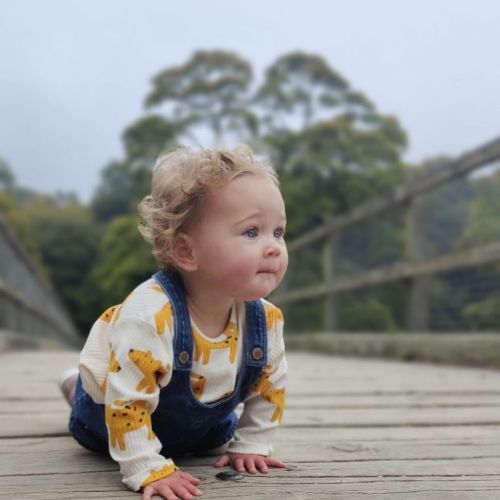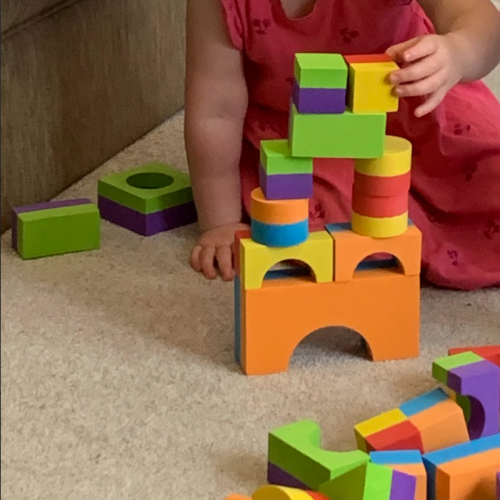Blog
What Really Matters for Babies?
Julia Manning-Morton is an independent consultant, author, lecturer and trainer in early years care and education, whose writing and teaching is focused on enabling and enthusing early years educators to develop practice and provision that supports the wellbeing of children from birth to three years old. Julia Manning-Morton is an independent consultant, author, lecturer and trainer in early years care and education, whose writing and teaching is focused on enabling and enthusing early years educators to develop practice and provision that supports the wellbeing of children from birth to three years old.
Common views of babies tend to emphasise what babies can't yet do, they are often seen as ‘incomplete’ people. But what really matters to babies is adults who see babies as unique human beings, who are active co-constructors of their lives; - valued for who they are now.
This is an abundance model that takes a holistic perspective of the child and focuses on children’s existing competencies, emphasising what babies have an abundance of enthusiasm for:
- Close relationships
- Learning about themselves and others.
- Moving, exploring and thinking
Babies are feeling, communicating, social people: Their main focus of learning is:
- Who they are as people.
- What other people are like.
- How to be together.


They experience, express and respond to a range of emotions very intensely, immediately and directly because their dependence on adults means that if they did not do so, their need for food, shelter, comfort and love could be overlooked and they might not survive.
If babies’ emotions are not responded to sensitively, they learn to expect little from their carers, receive negative messages about their worth and learn that the world is an untrustworthy place. So, what matters is that we develop positive emotional and relational environments for babies through nurturing relationships. By coordinating caregiving with the child’s care seeking, educators enable babies to develop an attachment relationship with them
Responsiveness and attunement are the necessary key characteristics of practitioners in supporting children’s wellbeing; - noticing, receiving and responding sensitively to all a baby’s communications. When adults are responsive and empathetic, children become able to understand their own feelings and to recognise and understand other people’s feelings too. This is the beginning of understanding other people’s minds, which leads to empathy and social understanding.
What matters is developing an effective Key Person Approach that is well understood by educators and communicated clearly to parents and is meaningful for the children. Focusing on practices that promote trusting relationships:
- Child-centred settling-in processes
- Continuity of caregiving
- A secure-base for play
- Dialogue with parents
Babies are learning about who they are, who they might become, what other people think about them and how they feel about themselves. This sense of self effects:
- How they relate to others
- Their attitude to learning and
- Their response to new experiences
Children who feel good about themselves are more empathetic and open to learning, which comes from feeling accepted by others who see you as competent and worthwhile.
Therefore, what matters is that all babies are respected and valued.
Babies' ideas about self, are forged through physical interactions: How they are held, cleaned, dressed and fed, effects their whole being: A baby who is held confidently, gently, and sensitivly will feel secure and learn trust.
So, what matters is respectful and unhurried physical interactions in care events. This means:
- Being present and giving the child your full attention.
- Slowing down.
- Encouraging co-operation and participation: Doing things with the child, not to them.
Where there is consistency and continuity in care events because babies are fed, changed and washed in much the same way, and usually by their key person, they are more able to make connections, think about their experiences and develop a continuous sense of self.
What really matters then is recognizing care events as key times for developing relationships and a sense of well-being and prime times for learning, so, we need to prioritise physical caregiving as central to our pedagogy for babies.
Babies are movers and doers; their physical selves are central to knowing themselves and the world. The stimulation of movement and manipulation of objects, enables their brains to form connections and allows them to explore concepts in a range of ways. This enables them to embody knowledge about objects, materials, space and time.
So, what really matters, is free movement. When babies are allowed to move without interference, they develop balance, core strength and agility, they also develop self-awareness and a sense of competence, autonomy and self-efficacy.
So, what matters is:
- Observation of the detail of movement to provide resources that are closely matched to babies’ interests.
- Uninterrupted time for movement play.
- Environments with sufficient but manageable challenge, in which babies can set their own goals and can also rest.
- Clothing that allows free movement.
Babies are curious, exploring the world, with their whole bodies and all their senses. Everything they hear, see, taste, touch, feel and smell, and all of their movements influence the way the brain makes its connections and thereby extends their learning in all areas.
In their play, babies and toddlers are asking
- ‘what is it?’,
- ‘what does it do?’
- ‘how does it work?’
Babies are not passive in their play, they are thinking about and making sense of the world through:
- Repetition
- Focusing on the process of an experience not a product
- Sharing with an interested and trusted adult
- Manipulating objects
- Experimenting with the effects of actions on materials
- Imitating and re-creating everyday experiences
So, what matters are adults who can accompany the child in their play without dominating or interfering in it. And a play environment where children can experience autonomy in self-directed active, embodied, meaningful play opportunities.
All in all, what really matters is developing an approach that works with the whole child. Because providing well for babies means thinking carefully about their rights, concerns, interests and needs and giving equal consideration to all aspects of practice and provision.
This requires highly skilled and committed educators who:
- Have an in-depth knowledge of child development, play and learning processes.
- Have well-developed observation skills and a well-informed pedagogical approach.
- Are empathetic, attuned and responsive
- Are self-aware effective communicators
So, what also really matters is effective support for educators’ wellbeing.
All information in this blog comes from: Manning-Morton, J. (2024) From Birth to Three: An Early Years Educator’s Handbook. London: Routledge
 |
Julia Manning-Morton Independent Consultant in the Early Years
|
